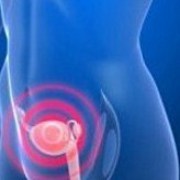 Photo: Getty Images
Photo: Getty Images
The American College of Obstetricians and Gynecologists (ACOG) defines endometriosis as a condition in which uterine tissue, called the endometrium, grows in places other than the uterus.
According to the National Institutes of Health (NIH), every month, ovaries produce hormones instructing the uterine cells to swell and thicken. The body removes these extra cells from the endometrium during the menstrual period. If these cells implant and grow outside the uterus, the result is endometriosis.
KidsHealth.org says these growths are typically located outside surface of the uterus, the ovaries, the fallopian tubes, the ligaments that support the uterus, the intestines, the bladder, the internal area between the vagina and rectum, and the pelvic cavity lining.
The main symptom of endometriosis is pelvic pain. NIH says this means painful periods; lower abdomen pain before and during menstruation; dull to severe cramps for a week or two before and during menstruation; pain during or following sexual intercourse; pain with bowel movements and pelvic or low back pain at any time during the menstrual cycle.
KidsHealth.org lists other symptoms as constipation, diarrhea, or seeing blood when going to the bathroom.
The Mayo Clinic warns some women with mild endometriosis have extensive pain, while others with advanced endometriosis may have little or no pain at all.
The cause of endometriosis is unknown but retrograde menstruation may be an explanation. The Mayo Clinic says in retrograde menstruation, menstrual blood containing endometrial cells flows back through the fallopian tubes and into the pelvic cavity instead of outside the body. These displaced cells stick to the pelvic walls and surfaces of pelvic organs, where they grow and continue to thicken and bleed during the menstrual cycle.
ACOG reports endometriosis is most common in women in their 30s and 40s, but can occur any time in menstruating women. It happens more often in women who’ve never had children or those with a family history.
NIH says other risk factors are starting a period at a young age and frequent or long-lasting periods. The Mayo Clinic adds medical conditions that prevent normal passage of menstrual flow and pelvic infection history.
Approximately one-third to one-half of women with endometriosis have trouble getting pregnant. However, the Mayo Clinic says many women with mild to moderate endometriosis can still conceive and carry a pregnancy to term.
KidsHealth.org says endometriosis can't be cured, but its symptoms usually can be controlled.
NIH says treatment options include pain relievers and hormone medications, including birth control, to stop endometriosis from getting worse. Another treatment is surgery, such as pelvic laparoscopy or laparotomy and hysterectomy, to remove the areas of endometriosis or the entire uterus and ovaries.
Unfortunately treatments may be temporary. ACOG says symptoms can come back.
Sources:
Endometriosis. MayoClinic.com by Mayo Foundation for Medical Education and Research. Web 10 Oct 2011.
http://www.mayoclinic.com/health/endometriosis/DS00289/DSECTION=symptoms
Endometriosis. PubMed Health by National Center for Biotechnology Information and the U.S. National Library of Medicine. Web 10 Oct 2011.
http://www.ncbi.nlm.nih.gov/pubmedhealth/PMH0001913/
Endometriosis. ACOG.org by the American College of Obstetricians and Gynecologists. Web 10 Oct 2011.
http://www.acog.org/publications/faq/faq013.cfm
Endometriosis. KidsHealth.org by the Nemours Foundation. Web 10 Oct 2011.
http://kidshealth.org/teen/sexual_health/girls/endometriosis.html
Reviewed October 18, 2011
by Michele Blacksberg RN
Edited by Jody Smith




Add a Comment2 Comments
I had savoir endometriosis and had to have every thing took out after my child was born at 10 months old plus she was born with downs as I just turned 35 years old with her it just seamed to only make it worse when she was born so I do feel for woman who have this.
October 21, 2011 - 6:16pmThis Comment
Endometriosis is a hormonal and an immune system disease. For more information and free brochures in 30+ languages, please go to the website of the Endometriosis Association at www.EndometriosisAssn.org
October 18, 2011 - 1:54pmThis Comment